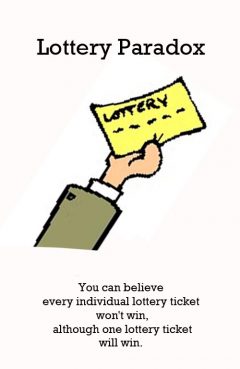The Lottery Paradox

Release Date: //1961
Country of Release:
Length:
MPAA:
Medium: Paradox
Genre:
Release Message: It is philosophically justifiable to believe that every individual lottery ticket won't win, but not justifiable to believe that no lottery ticket will win. Authored by Henry E. Kyburg, Jr.
Description: Henry E. Kyburg, Jr.'s lottery paradox (1961, p. 197) arises from considering a fair 1000 ticket lottery that has exactly one winning ticket. If this much is known about the execution of the lottery it is therefore rational to accept that some ticket will win. Suppose that an event is very likely only if the probability of it occurring is greater than 0.99. On these grounds it is presumed rational to accept the proposition that ticket 1 of the lottery will not win. Since the lottery is fair, it is rational to accept that ticket 2 won't win either--indeed, it is rational to accept for any individual ticket i of the lottery that ticket i will not win. However, accepting that ticket 1 won't win, accepting that ticket 2 won't win, and so on until accepting that ticket 1000 won't win: that entails that it is rational to accept that no ticket will win, which entails that it is rational to accept the contradictory proposition that one ticket wins and no ticket wins. The lottery paradox was designed to demonstrate that three attractive principles governing rational acceptance lead to contradiction, namely that It is rational to accept a proposition that is very likely true, It is irrational to accept a proposition that is known to be inconsistent, and If it is rational to accept a proposition A and it is rational to accept another proposition A', then it is rational to accept A & A', are jointly inconsistent. The paradox remains of continuing interest because it raises several issues at the foundations of knowledge representation and uncertain reasoning: the relationships between fallibility, corrigible belief and logical consequence; the roles that consistency, statistical evidence and probability play in belief fixation; the precise normative force that logical and probabilistic consistency have on rational belief.